
- Home
- About Us
- Sustainability
- Investors
- News
- People & Culture
-
Regions
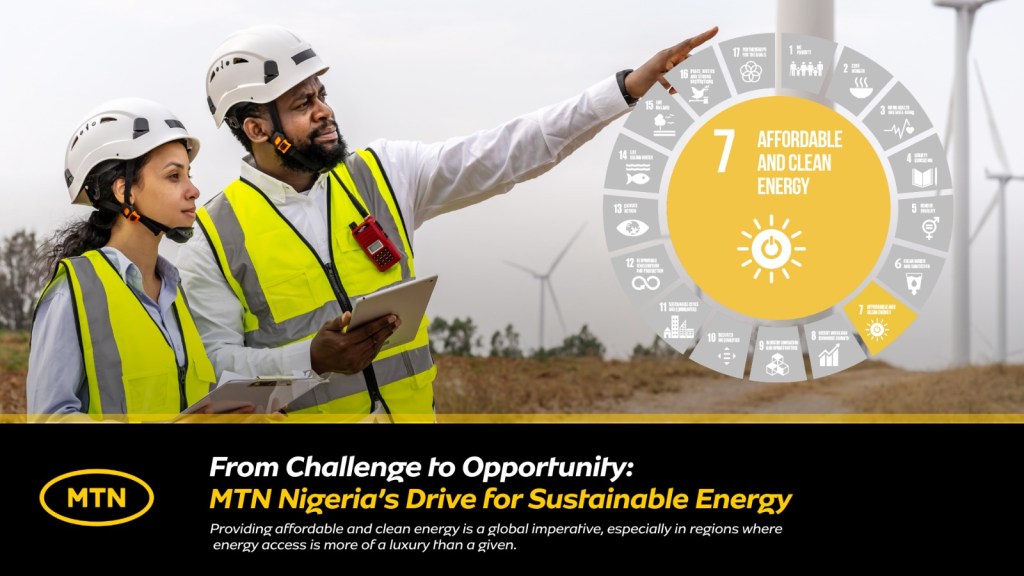
The challenge of providing affordable and clean energy is a global imperative, especially in regions where energy access is considered a luxury. The absence of reliable energy sources does more than darken homes; it stifles hospitals, hampers education, and hinders economic development. The ripple effects of this multidimensional issue touch everything from public health to job creation. In this context, United Nations Sustainable Development Goal 7 (SDG 7), which advocates for Affordable and Clean Energy, serves as a cornerstone for environmental stewardship and is a fundamental requirement for sustainable development and social equity.
In countries like Nigeria, the situation is acute. According to the World Bank, roughly 47% of the population lacks reliable access to electricity. This energy deficit could be described as both a symptom and a cause of broader developmental challenges, making the need for immediate and sustainable solutions more urgent.
MTN Nigeria has stepped up to meet this challenge through a strategic partnership with Independent Power Producers (IPPs), entities that generate electricity for sale to either the national grid or specific end-users. This alliance led to the deployment of a Compressed Natural Gas (CNG) power plant designed to supply MTN’s head office in Lagos and the Ikoyi Data Centre with a more sustainable energy source. The project incorporates an 11kV ring main unit – an electrical distribution component situated at the IPP vendor’s location, which helps increase the stability of power supply. This unit is connected to MTN’s facilities via a 2km 11kV underground cable, and the system is ingeniously designed with a two-input option to allow a seamless transition between the IPP-generated power and the national grid, ensuring a consistent and reliable power supply.
The forward-thinking initiative employs three 1.1MW gas generators, which produce a significant reduction in harmful emissions. Moreover, the cost per kilowatt-hour (kWh) of CNG is 60% lower than that of diesel, meaning this is a win for the environment and the wallet. This efficiency led to a substantial year-on-year drop in diesel consumption in 2022 – over 110,000 litres – translating to a financial saving of approximately 572 million Nigerian Naira in overall energy costs for MTN Plaza and Ikoyi Data Centre.
MTN Nigeria is making a meaningful contribution to a larger ecosystem of sustainability. The initiative serves as a compelling example of how private sector ingenuity can address immediate issues and contribute to broader societal goals. It underscores the transformative power of sustainable energy solutions in reshaping economies, uplifting communities, and safeguarding the environment for future generations.
The need for affordable and clean energy transcends technological challenges; it is a moral and social imperative that requires the collective efforts of governments, corporations, and communities. MTN Nigeria’s partnership with IPPs offers a viable and replicable model for addressing energy challenges, marking a significant step toward a more sustainable and equitable future.
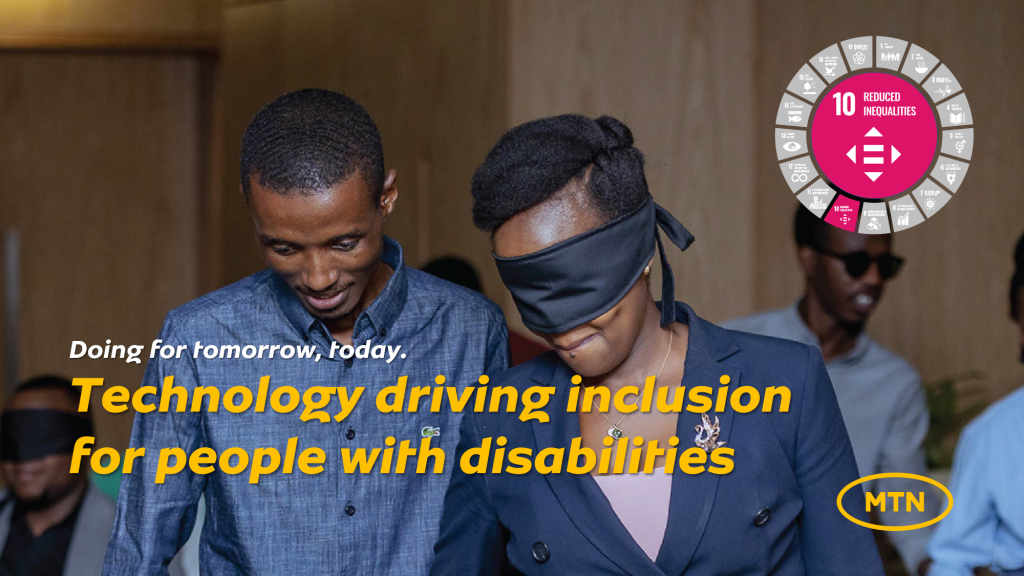
It is said that the true measure of any society can be found in how it treats its most vulnerable members. At MTN, we take this to heart and are deliberate in ensuring our customers experience our inclusive culture at various touchpoints, such as retail outlets and service centres. ‘Leave no one behind’ is the central, transformative promise of the 2030 Agenda for Sustainable Development, and our drive to digitally include vulnerable members of society aligns closely with UNSDG 10: Reduced Inequalities.
Driven by our core belief that everyone deserves the benefits of a modern connected life, MTN focuses on driving digital inclusion of all, with particular emphasis on vulnerable and marginalized groups. This includes women, children, youth, persons with disabilities, refugees, and rural citizens.
Spotlighting our specific efforts to drive inclusion of persons with disabilities is more critical than ever, given that, according to the World Health Organization, an estimated 1.3 billion people, or 16% of the global population, experience a significant disability. Astonishingly, 80% of this demographic resides in low- and middle-income countries. Mobile devices and services offer life-changing benefits, enabling more independent living. Yet, GSMA research indicates that many persons with disabilities remain unconnected and digitally excluded. MTN is actively working across its markets to rectify this.
MTN Rwanda introduced a programme in partnership with the National Union of Disability Organisations of Rwanda. The aim is to make MTN’s service and products more accessible to persons living with disabilities and to find ways to raise awareness and support the initiatives of the different organisations. Through this initiative, MTN Rwanda included sign language communication in all its television advertisements and interpreters in its call centre to aid persons with disabilities via video calls.
MTN eSwatini has also joined this inclusive movement by training its frontline and contact centre staff in sign language. This training supports the government’s agenda to be more inclusive of people living with disabilities. Customers can directly reach MTN eSwatini at 76 061 954 and access special bundles designed for the differently abled. These services have led to a 62% increase in video-calling interactions at our contact centres in the latter half of 2022 alone.
In South Africa, MTN is piloting an innovative national relay service (NRS) to serve visually and hearing-impaired people. The system harnesses the power of technology to enable users to make and receive phone calls. The pilot project, in partnership with Convo South Africa – a deaf-owned company – aims to expand communication access for those who otherwise could not communicate via voice call, audio, or video. Depending on the type of call, an operator speaks, types, or uses sign language when facilitating calls for or between deaf, hard-of-hearing, or deafblind South Africans. This initiative has made contacting emergency services more efficient for over 2.8 million South Africans with hearing or speech impairments.
MTN Cameroon is increasing their efforts to employ people with disabilities, train and render technical support to ensure an inclusive retail experience. This initiative is currently being scaled to our other operating markets.
As we forge ahead, MTN remains steadfast in its commitment to bridging the digital divide and fostering an inclusive society. Through these initiatives, we’re connecting communities and enriching lives, one individual at a time.
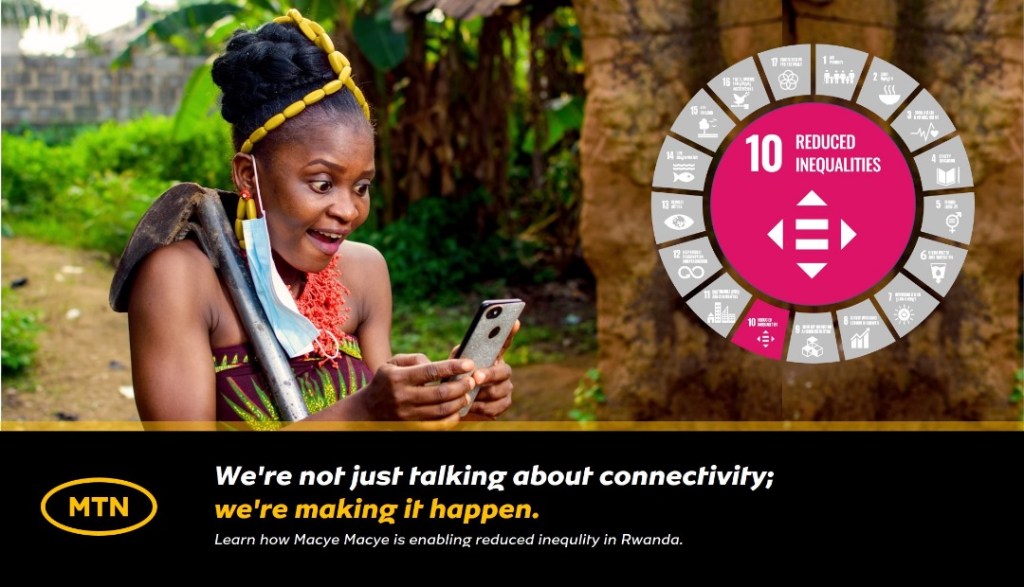
In the heart of Africa, a digital revolution is quietly unfolding. While the world races ahead with 5G and smart cities, many in Rwanda find themselves on the other side of a digital chasm, separated not by lack of will or skill but by the simple yet significant barrier of smartphone affordability. MTN Rwanda, in a groundbreaking alliance with the Bank of Kigali, is changing that narrative through Macye Macye, a device financing programme designed to put the power of connectivity into the hands of every Rwandan. This initiative aligns closely with UNSDG 10 by democratising access to technology and reducing economic inequalities.
The United Nations Sustainable Development Goals (UNSDGs), or simply SDGs, have set a global agenda for creating a more sustainable and equitable world. Comprising 17 interconnected goals, the SDGs aim to address some of humanity’s most pressing challenges. Among these goals, UNSDG 10, also known as Goal 10, specifically focuses on reducing inequalities within and among countries. It recognises that the growing disparities in income, education, and access to essential services pose significant barriers to achieving a just and prosperous world.
[1]According to GSMA, in Sub-Saharan Africa, Smartphone adoption reached 50% in 2022. Despite these gains, Sub-Saharan Africa still has the largest proportion of basic or feature phone connections (46%), followed by South Asia (27%). In other regions, basic or feature phone connections account for less than 15% of mobile connections. The smartphone ownership gender gaps continue to widen in Sub-Saharan Africa, with women being 37% less likely than men to own a smartphone compared to the 16% global average. The main barrier to smartphone ownership is smartphone affordability.
Tackling this significant obstacle head-on, the Macye Macye programme enables MTN customers to secure smartphones and tablets through credit options. These devices are readily available across a network of MTN service centres, franchisee locations, and other retail outlets. The programme’s streamlined approval and onboarding process allows customers to become smartphone owners for a daily cost as minimal as Rwf200.
Financially, the programme is designed with the consumer in mind. The Bank of Kigali, recently honoured as the ‘Best Bank in Rwanda 2022’ by Global Finance, uses a credit scoring system based on an individual’s telecom service purchases over the past year. This allows for a more personalised and fair financing option, in line with UNSDG 10’s focus on financial inclusion. Moreover, each device comes bundled with complimentary data, talk time, and SMSes, courtesy of MTN. Payment flexibility is another highlight; customers can opt for daily, weekly, or monthly payment plans, all facilitated seamlessly through Mobile Money.
The societal impact of Macye Macye is profound. In a nation where approximately 75% of the population does not own a smartphone, this programme is more than just a commercial venture; it’s a catalyst for change. It democratises internet access and serves as a stepping stone for Rwanda’s transition into a digitally innovative economy. The programme recently celebrated a significant milestone, connecting 100,000 Rwandans with affordable smartphones and, by extension, a wealth of information and opportunities.
While the focus is on Rwanda, the programme’s success offers valuable insights that could be replicated in other African markets, each with its unique challenges and opportunities. As we look to the future, MTN remains steadfast in its commitment to bridging the digital divide, not just in Rwanda but across the African continent. Through initiatives like Macye Macye, MTN continues to make meaningful strides in connecting communities, fostering economic growth, and elevating the quality of life for its customers.
[1] Source: GSMA Intelligence, The Mobile Economy Sub-Saharan Africa 2023, State of Mobile Internet Connectivty, 2022
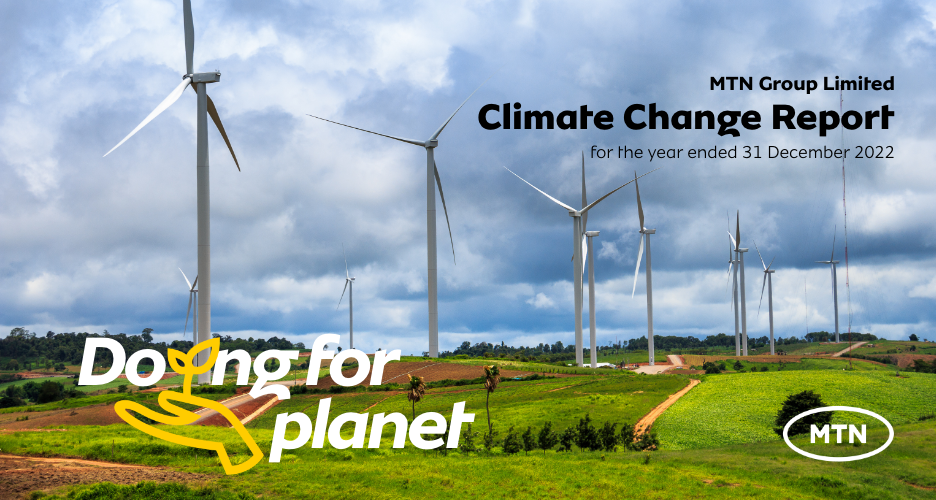
In the shadow of climate change, global leaders are racing to craft sustainable solutions. Every sector, from agriculture to health, feels the weight of its impact. Africa, which contributes a mere 5% of global GHG emissions, stands at the frontline of vulnerability.
MTN recognises this challenge and is poised to lead the charge toward a sustainable future. The recent COP27, aptly named the ‘African COP’, highlighted the continent’s unique position — rich in opportunities yet fraught with challenges. We at MTN were not just participants; we were collaborators, inspired by the global commitment to support developing nations.
The journey to a low-carbon economy is more than an environmental mandate; it’s a call for equity, inclusivity and a recognition of Africa’s diverse landscape. Success means more than reduced emissions; it means broader access to modern amenities, enhanced telecommunications and pathways to sustainable livelihoods.
MTN’s latest Climate Change Report, aligned with the Task Force on Climate-related Financial Disclosures (TCFD), outlines our commitment and work to address climate change. Our Project Zero, with its goal of Net Zero emissions by 2040, is testament to our dedication and belief in growth that harmonises with, not against, the planet’s well-being.
“Our actions are a reflection of our commitment,” says MTN Group President and CEO Ralph Mupita. “By taking action, we aim to inspire African resilience and innovation that champions sustainability at its core. With this in mind, we have submitted our climate goals to the Science Based Targets Initiative (SBTi) to expanding our green energy footprint. We’re striving for sustainable growth that benefits every African.”
MTN Chief Sustainability and Corporate Affairs Officer Nompilo Morafo says MTN’scommitment to sustainability goes beyond reducing emissions: “We’re investing in renewable energy sources, such as solar and wind, to power our operations. Our focus on digital innovation ensures that we’re not only enhancing connectivity but doing so in a manner that’s environmentally conscious. Every initiative, from high-efficiency lighting to our advanced 5G rollout, is a step towards a sustainable digital future for Africa.”
We are investing in electric vehicles, high-efficiency lighting, solar and wind power, and battery storage in our operations in the belief that these can bring about a thriving green economy that fosters green industries, enterprises and jobs for Africa by Africans.
Our digital innovations are resilient by design, primed to counteract the impacts of climate change. With the rollout of our 5G and fibre networks, we will further improve our energy consumption per unit of traffic.
But the journey is not without hurdles. The rising demand for connectivity brings with it the challenge of increased energy consumption. But we are undeterred. Inspired by our belief that everyone deserves the benefits of a modern connected life, we are charting a course toward a sustainable future.
Africa’s moment is now. We are embracing the challenges, unlocking the opportunities, and driving toward a future where technology and sustainability converge. Our path is clear and our commitment is unwavering. Together, we’re building a sustainable, inclusive world for all.
Click here to read our 2022 Climate change report.
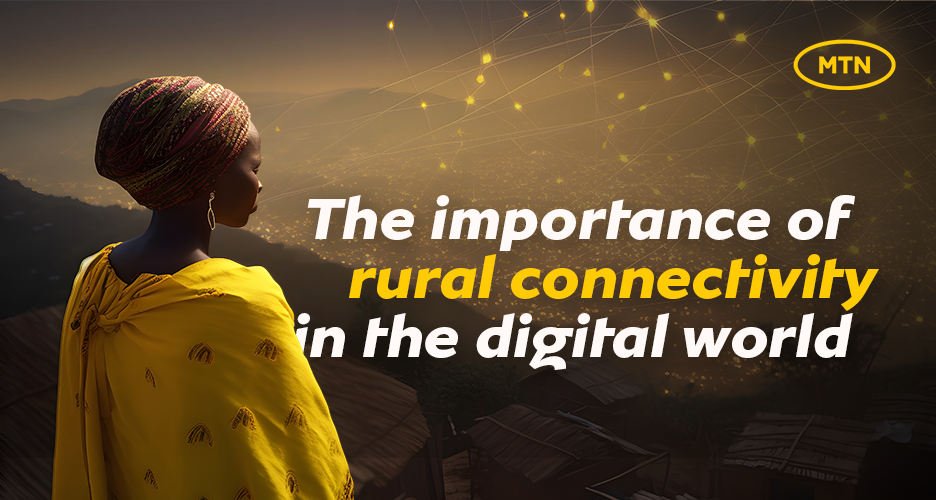
Imagine a world where the digital divide no longer exists, where every individual has access to the internet regardless of their location. This is the world MTN envisions and is tirelessly working towards. Yet, in an age where internet access is almost synonymous with opportunity, the ITU/UNESCO ‘2022 State of Broadband Report’ paints a stark picture: less than a quarter of households in sub-Saharan Africa have access to the internet.
At the heart of MTN is the belief that everyone deserves the benefits of a modern connected life. The vast number of people across our markets who remain disconnected from the mobile internet is not just a statistic; it represents countless dreams and potential waiting to be unlocked. This challenge and call to action strengthens our resolve and encourages us to remain focused on the task at hand, narrowing the digital divide.
“World-class connectivity is more than a service; it’s a catalyst for inclusive growth,” says MTN Group Chief Technology and Information Officer Mazen Mroue. “As we journey towards a digital future, we want to ensure that no one is left behind. So, we are working hard to close the coverage gap in rural and remote areas; achieving this, and doing so quickly, would not be possible without the active collaboration of our partners.”
In 2022, we took significant strides, overcoming some of the key barriers to mobile internet adoption. We expanded our broadband coverage including 4G and 5G to include an additional 54 million people across our footprint.
Through substantial investments in site rollout, we increased our broadband network coverage to reach 87.8% of the 750 million people in our markets, a rise from 83% in 2021. This brought us a step closer to our objective of providing 95% broadband coverage by 2025. To ensure we stay on track, we’ve tied executive remuneration to our progress in achieving this and other ESG measures.
Accelerating rollout
In 2022, we rolled out 1 669 new rural sites, expanding our rural coverage to 30.8 million people, up from 23 million in 2021 and 8.5 million the year before. To expedite rollout, we worked in collaboration with nine specialist partners, embraced new commercial partnership models, and implemented OpenRAN technology.
“OpenRAN enables us to supplement or replace existing radio access network providers. An OpenRAN environment expands the ecosystem, lowers costs and accelerates innovation,” says Mroué. “To complement our rural terrestrial network, we are also investigating pilot projects for low-earth-orbit satellite connectivity,” he adds.
The motivation for all this work remains the delivery of MTN Group’s Ambition 2025, which is ‘Leading digital solutions for Africa’s progress.’
“We are already seeing rural communities reap the benefit of increased broadband coverage. They are increasingly accessing information, education and tools such as Mobile Money (MoMo),” says Mroué, adding that this supported the Group’s efforts to extend digital and financial inclusion across the continent.
MTN remains deeply committed to playing a transformative role in Africa’s mobile internet revolution. While the road ahead is filled with challenges, our resolve remains unshaken. We aim to connect the unconnected and unlock a world of endless possibilities.
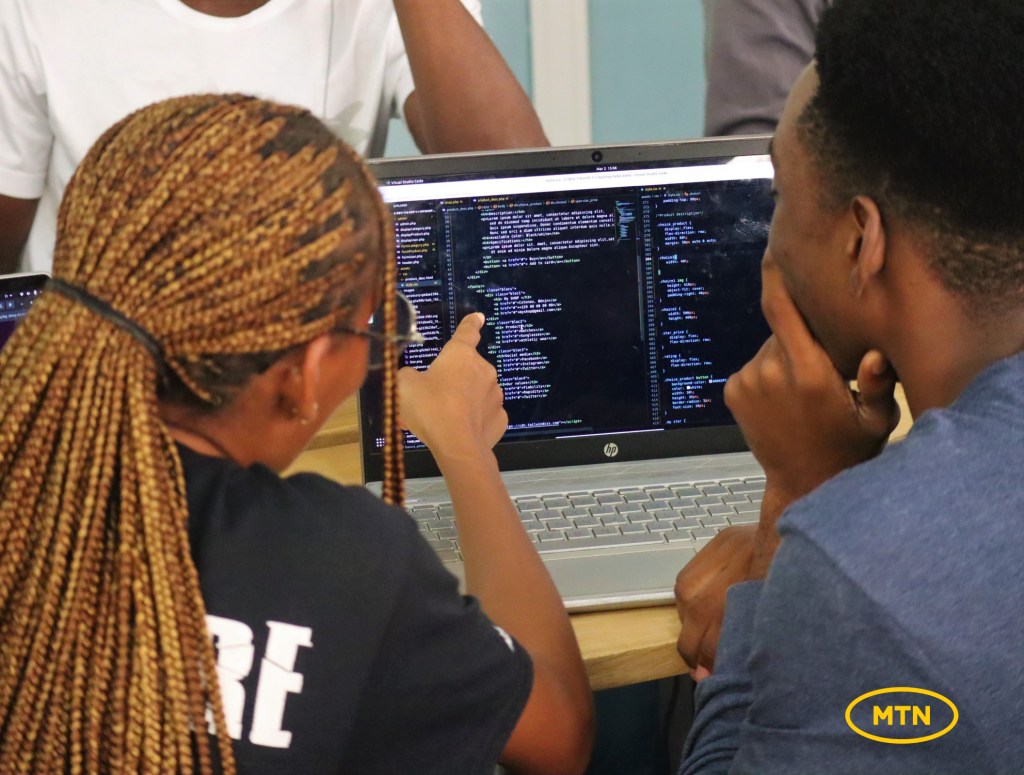
The future of Africa lies in the hands of its youth. The global youth population is set to increase by over 78 million between 2021 and 2030, with a significant portion of this growth happening in low-income countries. Education and training systems need to respond to this challenge.[1]
Educators – teachers, trainers, and mentors – play a crucial role in this process. They are the ones who can unlock the potential of our youth, providing them with the skills they need to navigate the future. This learning can take place in a variety of settings, from online classrooms to community learning spaces.
However, it’s important to recognise that for many young people, especially in Africa, the existing education system does not fully meet their needs. This leaves a significant number of our youth without adequate education or skills and uncertain about their future. Globally, more than a fifth of individuals aged 15-34 are not engaged in education, employment, or training[2], and Africa records the lowest youth enrolment in education. This challenge is further compounded by gender disparities, with young women less likely to be enrolled in education than young men.[3]
Despite these challenges, there is potential for growth. Advanced fields such as artificial intelligence, scientific computing, and human-computer interaction remain relatively untapped on the continent[4]. By 2030, it is estimated that Sub-Saharan Africa alone will have 230 million “digital jobs”[5]. In response to this urgent need, MTN has taken the initiative and launched the MTN Skills Academy to address the challenge head-on.
Introduced at MWC Africa in Kigali in 2022, the Skills Academy is now being gradually implemented in our markets, with a successful initial launch in Zambia. Our upcoming markets to embrace this initiative include Uganda, eSwatini, and Cote d’Ivoire. We firmly believe that by granting access to an online platform that provides digital and financial skills across various levels—ranging from foundational to advanced—we can empower the younger generation to enhance their expertise within the digital economy. This, in turn, will equip them for the challenges and opportunities presented by the 4th industrial revolution.
But this “Tool for Doers” is more than just a training platform. It’s a holistic model of upskilling, an ecosystem that goes beyond imparting digital and financial skills. We believe that access to information, career guidance, and soft skills development are equally important in shaping future leaders.
Our commitment to youth empowerment is reflected across our markets, with numerous CSI programmes and partnerships focusing on digital education. These collaborations with civil society, government organizations, local communities, NGOs, and other sector players ensure that we play our part in offering relevant solutions to local challenges.
For instance, in Benin, we have the Tita Digital Skills Programme. This initiative is designed to enhance the digital environment in public universities, thereby fostering job creation and youth entrepreneurship. The project is a testament to our long-term vision and commitment to progressively provide access to digital trainings and create digital ecosystems of committed, innovative, and inspiring learners in public universities. Through this project, we are partnering with public universities and the Ministry of Higher Education, as well as engaging with existing ICT organisations to achieve an even greater impact.
In Cameroon, we have initiated the Y’ello Digital Talent Competition. This is a digital competition for universities and engineering schools with the aim to involve young people in the reflection and quest for optimal and impactful solutions to the development issues of our country. The theme for the first edition is the development of digital solutions in the field of education. This competition not only encourages innovation but also provides a platform for young people to contribute to the development of their country.
Meanwhile, in Congo Brazzaville, we have the School Connectivity Project. This project has equipped the students of the Denis Sassou Nguesso University with a connected room fully equipped with computers and internet connection to support their academic curriculum and help them integrate digital tools in their learning process. Through this initiative, we are improving teaching and learning techniques in the university by increasing the number of students able to use ICT tools and reducing the digital divide.
As we look towards the future, we see a digitally inclusive world where every young person in Africa has the opportunity to thrive. The MTN Skills Academy and our numerous CSI programmes are more than initiatives; they are a testament to our commitment to this goal. We’re not just preparing our youth for the future; we’re empowering them to shape it.
In the spirit of the recently commemorated World Youth Skills Day, we reaffirm our dedication to this endeavor. We believe in the power of our youth, their potential to transform the future, and the promise of a digitally inclusive world. With this in mind, we’re not just doing this for today; we’re #doingfortomorrowtoday.
[1] https://www.un.org/en/observances/world-youth-skills-day
[2] https://globaleducationcoalition.unesco.org/global-skills-academy
[3] https://www.ilo.org/global/publications/books/WCMS_737648/lang–en/index.htm
[4] World Bank, “The Future of Work in Africa: Harnessing the Potential of Digital Technologies for All”
[5] 2019, Digital Skills in Sub-Saharan Africa, Spotlight on Ghana, IFC
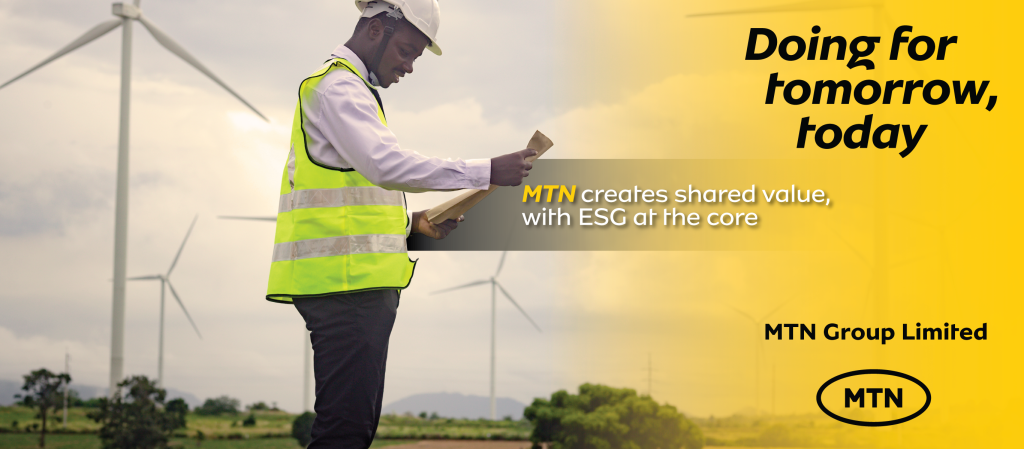
MTN Group is committed to enabling the benefits of a modern connected life for everyone in our markets. Our 2022 Sustainability Report (SR) spells out our work in the year to create shared value, with ESG at the core.
In a year fraught with challenges, we remained focused onensuring that we create value for our stakeholders through responsible environmental, social, governance and economic value-added practices and solutions. The challenges included the protracted effects of the pandemic and the first war in Europe in 80 years, accelerating inflation, supply chain disruptions and the escalating climate crisis.
Reflecting on the increasing global focus on sustainability, Nompilo Morafo, MTN Group Chief Sustainability & Corporate Affairs Officer said, “Organisations are now expected from than ever before to operate responsibly, with integrity, and with a focus on the wellbeing of our communities and planet.
“By combining our core connectivity and mobility strengths with emerging technologies such as 5G, AI, cloud computing and machine learning, we are laying the groundwork for a thriving digital economy and helping to solve many of the challenges facing our customers and communities today.”
Among key ESG metrics on which we made improvements in 2022 are the Group’s reduction of GHG emissions in the year (approximately 13.9%^ compared to an annual target of 3.5% in pursuit of reaching Net Zero emissions by 2040); MTN’scontribution to sustainable societies through increasing broadband coverage (to 88% of the population from 83% in 2021); and our performance score on governance, freedom of expression and privacy according to Ranking Digital Rights (the most improved company in the index for the second year in a row).
In a case study, we spell out MTN South Africa’s work to reduce GHG emissions, our energy footprint and our reliance on the national grid through a major solar project to make our 14thAvenue head office a completely green one.
We also detail our economic contribution to society (approximately R149 billion from R115 billion in 2021); discuss our circular economy efforts and those to use natural resources responsibly; our work to accelerate digital and financial inclusion; initiatives to foster a more diverse society (including increasing the representation of women at MTN to 40%); and projects to safeguard our people and customers and further embed ethical and responsible business practices.
Driven to ensure a diverse and inclusive workforce in 2022 for the second year running, we performed a gender pay gap assessment across 18 markets. We focused our efforts to determine the reasons for the gender pay gap, and established plans to reduce this over the short and medium term.
In case studies from eSwatini, Rwanda and South Africa we discuss efforts to make MTN’s products and services more accessible to people living with disabilities, and in particular to develop products and services to meet the communication needs of the visually and hearing-impaired community.
With a focus on growth, we outline how we are enabling local economies, empowering local enterprises and unlocking local ownership across our markets. We refer to our tax contribution;our network infrastructure investment; and our localisation and enterprise development initiatives, including providing digital skills training to more than 1 250 SMEs.
A case study on Rwanda shows MTN’s MoMo platform integration to enable the collection of various government services, taxes and fees, and the disbursement of local government payments to vulnerable people, as well as the payment of university student bursaries and teacher salaries through MoMo.
As we strive to be the partner of choice to our nation-state hosts, communities, suppliers and other stakeholders, every year we monitor how our stakeholders view us. In 2022, our Reputation Index Survey showed a score of 79.6%, compared to our 75% target.
“All these efforts – including our work to cut GHG emissions, strengthen data privacy and security, minimise the gender pay gap and uphold digital human rights are reflected in the continued improvement in the ESG ratings accorded to MTN by key raters and rankers,” says Morafo.
We invite all our stakeholders to read our 2022 Sustainability Report as we continue to position MTN at the centre of Africa’s transformation to improve people’s quality of life and to be economically empowering and environmentally sustainable.
In particular, we draw stakeholders’ attention to numerous case studies on a wide range of topics from Cameroon, eSwatini,Ghana, Nigeria, Rwanda, South Africa, Uganda and Zambia.
Read our sustainability report here: https://bit.ly/42qwneG
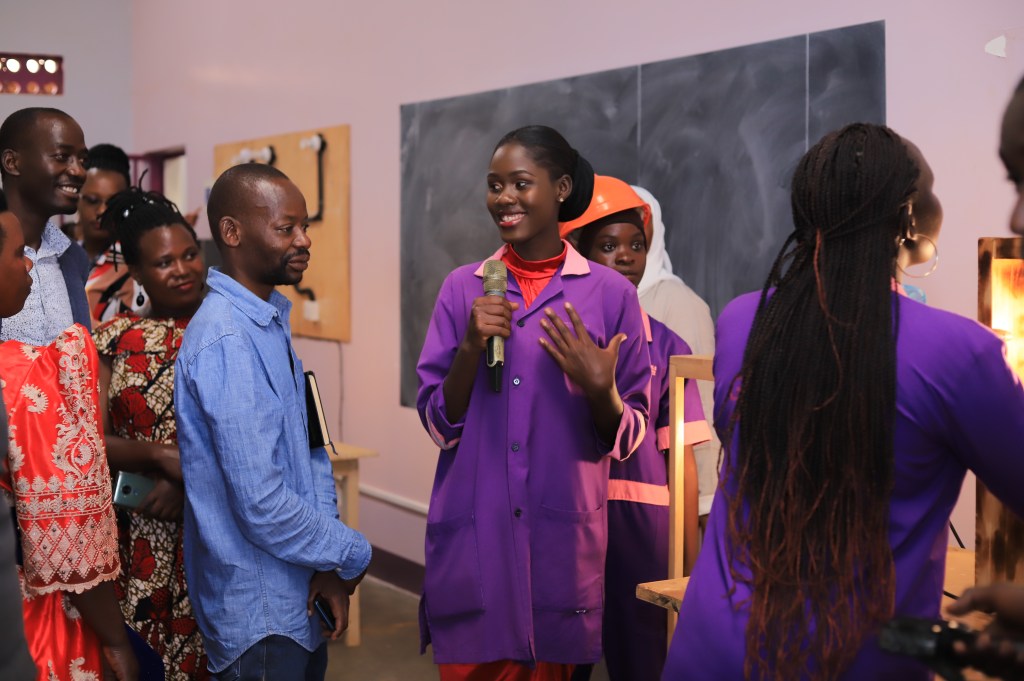
Nabatanzi Flavia, at 23 years old, is the eldest of four siblings raised by a single mother. When her Grade 12 (S.6) results were released, Nabatanzi’s life came to a standstill as her mother could not afford university fees. The death of Flavia’s father had forced her stay-at-home mother into a state of shutdown, leaving her struggling to make ends meet and ensure Flavia’s siblings could attend school and achieve a Grade 7 (P7) certificate. Flavia’s mother advised her to work at a salon, contributing to the household income and helping to pay for her siblings’ education and the family’s basic needs.
One morning, a neighbor brought Flavia a flier for the Smart Girls Foundation’s “GIRLS WITH TOOLS” project, which offered free training in traditionally male-dominated careers. Although initially hesitant and influenced by her community’s belief that engineering skills were unsuitable for girls, Flavia gained the courage to enroll in electrical engineering after receiving orientation and counseling.
During her 2019 training at the Smart Girls Foundation Uganda, the MTN Foundation visited the center and made a Y’ello Care donation. This event further inspired Flavia as she interacted with MTN Uganda female employees from similar backgrounds. The MTN Foundation’s donation of tools to the GIRLS WITH TOOLS program increased Flavia’s passion for electrical engineering, as it provided more learning resources for skill development.
In 2021 and 2022, the MTN Foundation built the New Home GIRLS WITH TOOLS Skilling Center and donated computers, providing girls like Flavia with a well-equipped and functional learning environment. Now a 2023 graduate of the MTN GIRLS WITH TOOLS program, Flavia works as an electrical engineer for MANTRAC UGANDA Limited on the Tilenga Total Hoima project. She is proud that her skills enable her to support her family while taking care of her own needs. Flavia also gives back to the Smart Girls Foundation Uganda by teaching and mentoring girls enrolled in similar programs, as she appreciates the opportunities provided by the MTN GIRLS WITH TOOLS initiative.
Flavia envisions herself becoming one of Africa’s leading female electrical engineers within five years, using her skills and tools to inspire others. Committed to self-improvement, she is a highly motivated, passionate, and hardworking individual. Flavia’s strong work ethic, good values, and excellent skillset, gained through the MTN GIRLS WITH TOOLS program, continue to open doors and create opportunities for her.
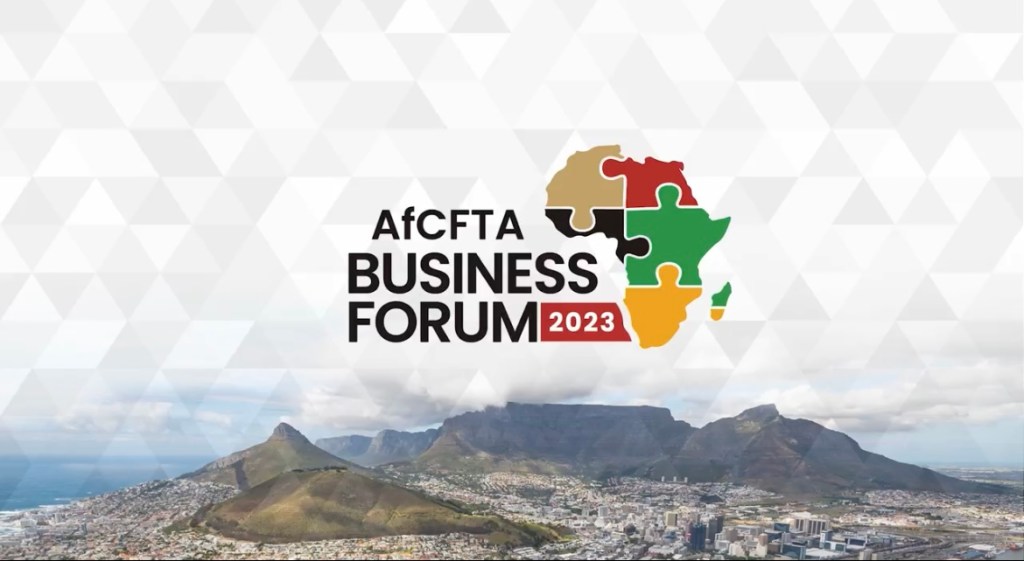
Africa’s burgeoning youth population, which promises for it to boast the largest workforce globally by 2040, provides significant opportunity for the continent’s growth. To achieve this will require that the public and private sector work together to ensure that Africa is driving behind a single vision. That is why, as a Pan African mobile operator with a geographic breadth spanning 17 markets in Africa, MTN Group stood behind the African Continental Free Trade Agreement (“AfCFTA”) secretariat as sponsor for its recent business forum during 16-18 April in Cape Town under the theme Acceleration of Implementation of the AfCFTA.
The AfCFTA is the flagship project of the African Union’s Ambition 2063 and has, to date, been signed by 54 nations and ratified by 43. Through this avenue the AU aims to deliver the largest free-trade area globally while achieving inclusive and sustainable development across the continent. Through fora such as this the AfCFTA secretariat convenes business leaders and policy makers from across the continent to share their thoughts and recommendations on how Africa’s potential can be harnessed through the AfCFTA.
Commenting on the importance of the private sector’s participation, MTN Group Chief Sustainability and Corporate Affairs Officer, Nompilo Morafo said: “Realising the growth and development potential associated with the AfCFTA will require strong and sustainable partnerships between the public and private sector.” She adds: “It will therefore come as no surprise that MTN Group’s strategy, which is anchored on building the largest and most valuable platforms with a clear focus on Africa, recognises the importance of engaging in selective partnerships that will leverage our brand, the most valuable in Africa.”
With a vision to lead digital solutions for Africa’s progress, MTN is of the belief that digital transformation can play a critical role in accelerating the realisation of the AfCFTA and intra-Africa trade. This was demonstrated clearly during the height of the COVID-19 pandemic where movement was restricted yet economies could not stop. During this period digital infrastructure was a key enabler of connectivity and productivity globally. In Africa too, there was a significant increase in the demand for data and fintech solutions, which benefitted from the investments we made in our infrastructure and networks.
Morafo, who spoke on a panel that took into consideration the current geo-economic context, referenced climate change and conflict in the Ukraine, together with COVID-19 as the three C’s impacting Africa. During this panel she highlighted the 97% infrastructure deficit in trade-enabling sectors and noted the importance of extending digital and financial inclusion as a positive force for the transformation of individuals, companies and society.
For MTN the infrastructure deficit is an opportunity to support its nation states and build back better through investment in enabling infrastructure. To this end MTN has a target of rolling out 135 000km of proprietary infrastructure across Africa. This will enhance the critical backbone that enables seamless communication, transactions and trade across the continent.
MTN is of the view that infrastructure should not only be seen as the tangible roads and fibre networks that are built to enhance trade. Reducing the “soft infrastructure” or skills deficit across the continent is a critical contributer towards meeting the goals of the AfCFTA. In support of this, the Group has in place the MTN Group Skills Academy whose aim is to ensure 60% of youth and adults across its markets have a minimum level of proficiency in sustainable digital skills by 2025. This is aligned to the AU’s Digital Transformation strategy and the United Nations’ Broadband Commission for Sustainable Development.
“In addition to being a key driver for closing the infrastructure gap across the continent, the AfCFTA provides an important opportunity to harmonise the policies and regulations of the continent, to ease the movement of people across and between markets thus benefitting from the cross pollination of ideas and encouraging skills transfer as well as driving the movement of goods and services. Whilst there is still much more to be done, I am excited about the opportunities that face us, more especially the Protocol on Digital Trade which will create efficiencies across our industries,” concludes Morafo.
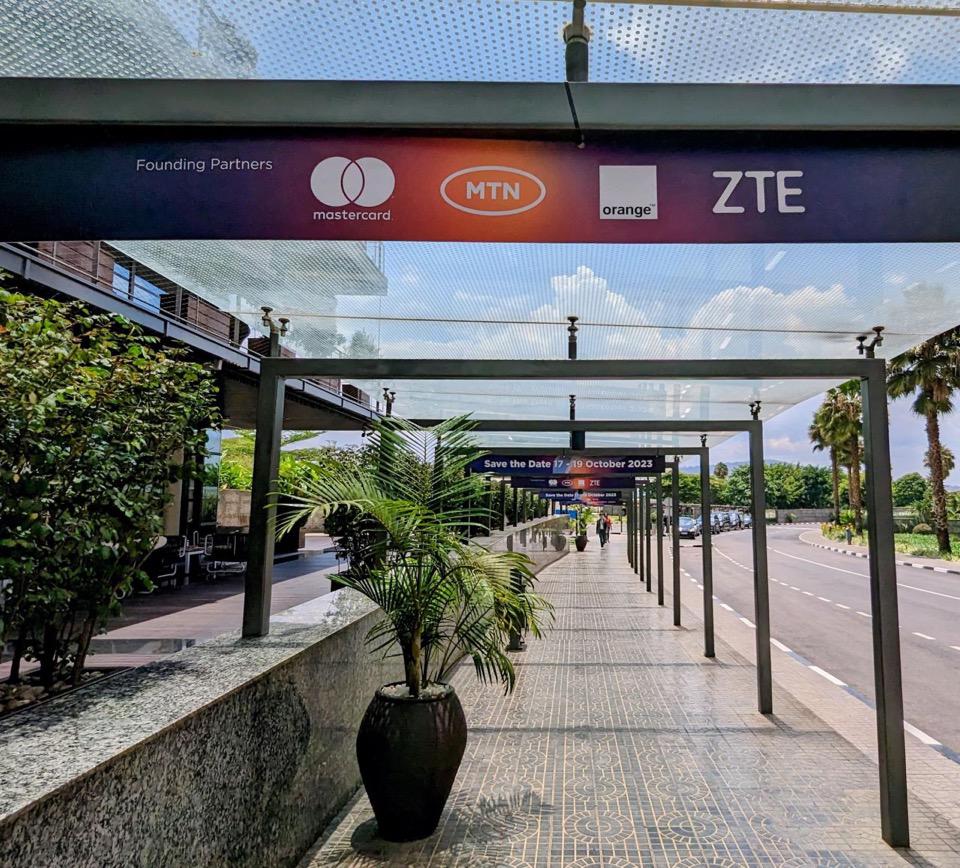
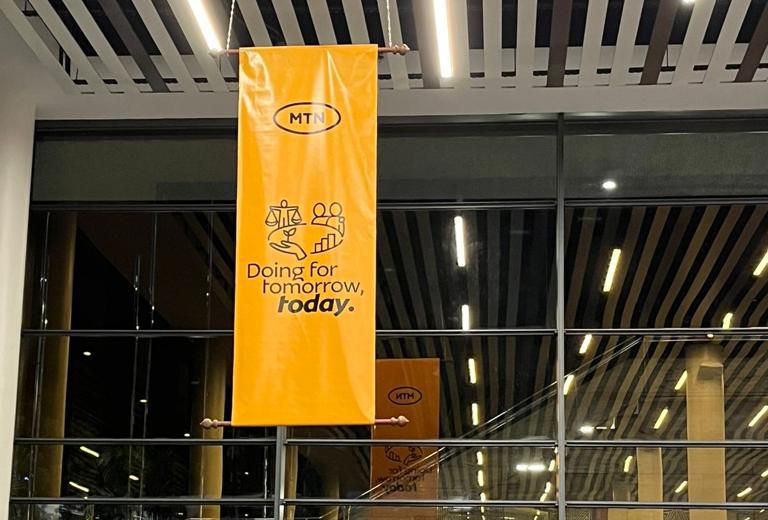
Recognising the need to engage and collaborate to achieve the effective, rapid and comprehensive digital transformation of Africa, MTN Group is a key participant and founding partner of Mobile World Congress (MWC) Africa, which this year is taking place on the continent for the first time.
Called ‘Connectivity Unleashed’, MWC Africa starts in Kigali, Rwanda today and runs until Thursday 27 October. It brings together hundreds of delegates from across the globe, exploring themes such as ‘Leadership for Connectivity’, ‘One People, One Purpose’, ‘Accelerate Africa’ and ‘Fintech’.
“From using 5G to enable digital growth across industries to stepping into the metaverse, we are excited to be building partnerships to solve some of the continent’s many challenges. MWC is a great opportunity for MTN to collaborate with others who want to make the same impact,” says MTN Group President and CEO Ralph Mupita.
Among the topics on which MTN executives will be engaging are: ‘What does Metaverse mean for Africa?’; ‘Progressive policy to accelerate the digital agenda in Africa’; ‘Setting the mobile money agenda for the next generation’; ‘Beyond the smartphone – developing innovative 5G use-cases and applications for Africa’; and ‘Digital transformation to accelerate the African Continental Free Trade Agreement’.
Determined to play our part in building the digital skills that Africa needs for its digital transformation, MTN will launch the MTN Skills Academy on the sidelines of MWC Africa, aiming to develop people across the continent as producers, consumers and innovators of digital technologies. This is part of our work to build digital skills for digital jobs, through which we will upskill the continent’s most valuable asset – its people – to help close the jobs gap in a sustainable and measurable way. Investing in digital capabilities of citizens underpinned by both technological and human capacity offers the most robust approach for the future. This is aligned to MTN’s Ambition 2025 strategy: Leading digital solutions for Africa’s progress.